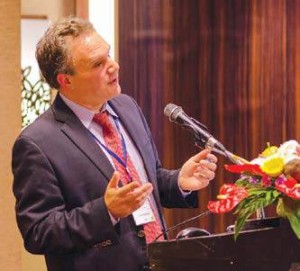Policies designed to promote maize industry growth require data and information, which is often difficult to obtain in Asian countries. This was discussed during the technical session on improving maize seed systems in Asia at the 12th Asian Maize Conference. David Spielman, senior research fellow at the International Food Policy Research Institute (IFPRI), highlighted that policy-makers often face difficult challenges in promoting seed industry growth – especially in Asian countries that have more smallholder and resource-poor farmers.
 Spielman said, “Innovation policies require data on firm-level research and development spending; product pipeline and competition policies require data on market structure and firm behavior.”
Spielman said, “Innovation policies require data on firm-level research and development spending; product pipeline and competition policies require data on market structure and firm behavior.”
Firms often do not share proprietary revenue data and governments may not monitor firm-level activity on a regular basis. One of the factors could be that policy-makers are not sufficiently informed about the opportunities and trade-offs associated with designing laws and regulations that enable the effective governance of seed industry development. Spielman emphasized that a better designed dataset with a finite set of indicators to measure competition and innovation in a country’s seed industry can better inform policy-makers.
The conference highlighted the need for the public and private sectors to work together to provide affordable new seed varieties and deliver new technologies to smallholder farmers. An eminent group of panelists – Arvind Kumar, Rasi Seeds; Shilpa Divekar Nirula, Monsanto; Fan Xingming, Yunnan Academy of Agricultural Sciences, China; John McMurdy, U.S. Agency for International Development; and Bijendra Pal, Bioseed, discussed the opportunities and challenges to ensure a vibrant Asian maize seed sector through public-private partnerships (PPPs).
The panel noted that decision-makers should not look at public vs. private; rather they should learn from models and best practices where the two sectors have worked together successfully.
As a best practice on PPPs, Ian Barker, head of agricultural partnerships at the Syngenta Foundation for Sustainable Agriculture (SFSA), talked about its Seeds2B program in Africa that builds linkages between breeders and seed companies to make more improved seed varieties available to farmers at the right time and price.
He also highlighted that SFSA is now aiming to kick- start the Seed2B concept in Asia – bringing together breeders, seed companies, farmer associations and other relevant players in the Asian maize value chain – to improve access to seed in marginal maize areas. Barker said, “Public-private breeding partnerships can efficiently deliver new affordable and accessible hybrids – correctly positioned and targeted at proven smallholder demand.”
 Nutrition, health and food security
Nutrition, health and food security